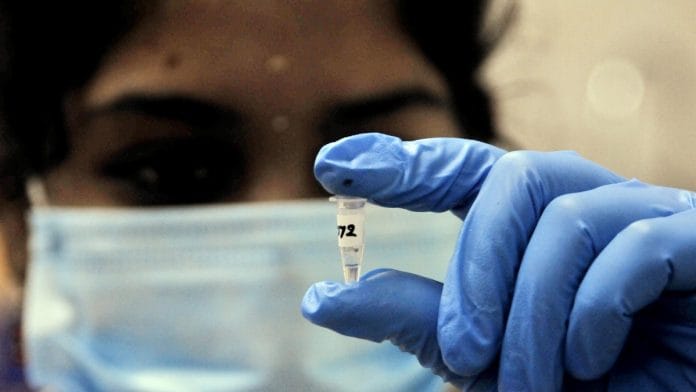New Delhi/Bengaluru: The first two known cases of the Omicron variant of SARS-CoV-2 virus in India — a 46-year-old Indian man and a 66-year-old South African national — were both fully vaccinated.
By the time the genome sequencing results came in late Wednesday night, the South African national had already left for Dubai. The Indian man, meanwhile, has no history of travel, Karnataka Health Minister Dr K. Sudhakar said Thursday.
Three primary contacts and two secondary contacts of the Indian patient also tested positive between 22 and 25 November, Karnataka health officials said in a statement. All are in isolation. A total of 13 of the man’s primary contacts and 205 secondary contacts have been traced so far.
The 66-year-old South African national travelled from that country on 20 November with a negative Covid test report, and was tested at Bengaluru airport, the report for which came out positive. There were 24 primary contacts, all of whom have tested negative. This individual left India on 27 November.
The Indian man, a doctor by profession, developed symptoms on 21 November and was found to be Covid positive a day later. His samples were sent for sequencing because his cycle threshold values were found to be low. The Omicron variant has a different presentation in RT-PCR than other variants. The man stayed in home isolation for two days and was then in a hospital for three days. He was discharged on 27 November.
Speaking about the Omicron variant during a media briefing Thursday, Union health ministry joint secretary Lav Agarwal said with about 45-52 mutations, including about 26-32 in the spike protein, Omicron is “of the order of 500 per cent more competitively infectious”.
The ‘heavily mutated’ Omicron variant was first identified by officials in South Africa. The mutation raised “serious” concerns after it seemed to dominate all infections in the country in less than two weeks.
Also read: ‘Bruce Lee assault’ — ICMR official explains why Covaxin may have edge against Omicron
No go-ahead on booster shots
At the central government’s press briefing, NITI Aayog member (Health) Dr V.K. Paul said the two cases would not change the government’s current priority of vaccinating the unvaccinated, and completing the process of immunisation of all adults in the country. Scientific evidence both on booster shots and vaccination of children are under consideration, and there is currently no plan for either.
“The important thing to understand about Omicron is that the same tools that we were using to fight Covid so far should continue to be used. There should not be any deficiencies in that. We need to ramp up testing, keep our hospital infrastructure prepared and continue to mask up,” Dr Paul said.
Indian Council of Medical Research (ICMR) Director General Dr Balram Bhargava said that awareness, and not panic, is the key, adding that both doses of the vaccine need to be taken.
Dr Paul also said there is no plan either to decrease the gap between vaccine doses. India’s dose gap of 12-16 weeks for Covishield is among the highest in the world.
“We will decide everything based on science. The impact of Omicron is still being understood and our laboratories are working hard at it. Everything will be carefully examined,” Dr Paul said in reply to a question about decreasing the dose gap. He also said that “breakthrough infection rates are extremely low” in India.
(Edited by Neha Mahajan)
Also read: ‘Heavily mutated’ Omicron has world worried. But mutations could make it easier to detect






